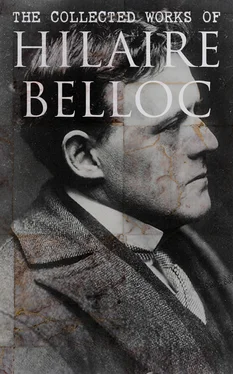Meanwhile, at Plancenoit, further French reinforcements had recaptured the village and again lost it. The Sixth Corps had given way before the Prussian advance, as we have seen. The next French reinforcements, though they had at first thrust the Prussians back, in turn gave way as the last units of the enemy arrived, and the Prussian batteries were dropping shot right on to the fields which bordered the Brussels road.
Napoleon took eleven battalions of the Guard (the Imperial Guard was his reserve, and had not yet come into action 25) and drew them up upon his flank to defend the Brussels road; with two more battalions he reinforced the wavering troops in Plancenoit. They cleared the enemy out of the village with the bayonet, and for the moment checked that pressure upon the flank and rear which could not but ultimately return.
It was somewhat past seven by the time all this was accomplished. Napoleon surveyed a field over which it was still just possible (in his judgment at least) to strike a blow that might save him. He saw, far upon the left, Hougomont in flames; in the centre, La Haye Sainte captured; on the right, the skirmishers advancing upon the slope before the English line; his eastern flank for the moment free of the Prussians, who had retired before the sudden charge of the Guard. He heard far off a cannonade which might be that of Grouchy.
But even as he looked upon his opportunity he saw one further thing that goaded him to an immediate hazard. Upon the north-eastern corner of his strained and bent-back line of battle, against the far, perilous, exposed angle of it, he saw new, quite unexpected hordes of men advancing. It was Ziethen debouching with the head of his First Prussian Army Corps at this latest hour—and Napoleon saw those most distant of his troops ready to yield to the new torrent.
The sun, now within an hour of setting, had shone out again. Its light came level down the shallow valley, but all that hollow was so filled with the smoke of recent discharges that the last stroke which Napoleon was now preparing was in part hidden from the Allies upon the hill. That final stake, the only venture left, was to be use of his last reserve and the charge of the Guard.
No combat in history, perhaps, had seen a situation so desperate maintained without the order for retreat. Wellington’s front, which the French were attacking, was still held unbroken; upon the French flank and rear, though the Fourth Prussian Army Corps were for the moment held, they must inevitably return; more remained to come: they were in the act of pressing upon the only line open to the French for retreat, and now here came Ziethen with his new masses upon the top of all.
If, at this hour, just after seven, upon that fatal day, retreat had been possible or advisable to Napoleon, every rule of military art demanded it. He was now quite outnumbered; his exhausted troops were strained up to and beyond the breaking point. To carry such strains too far means in all things, not only in war, an irretrievable catastrophe.
But retreat was hardly possible as a military action; it was impossible as a political one.
Napoleon could hardly retreat at that hour, although he was already defeated, because the fury and the exhaustion of the combat, its increasing confusion, and the increasing dispersion of its units, made any rapid concentration and organisation for the purposes of a sudden retirement hazardous in the extreme. The doomed body, held closer and closer upon its right flank, menaced more and more on its right rear, now suddenly threatened on its exposed salient angle, would fight on.
Though Napoleon had withdrawn from the combat an hour before, when Bülow’s 30,000 had struck at his right flank and made his destruction certain; though he had then, while yet he could, organised a retirement, abandoned the furious struggle for La Haye Sainte before it was successful, and covered with his best troops an immediate retreat, that retreat would not have availed his cause.
The appearance of the Prussians on his right proved glaringly the nature of his doom. Grouchy—a quarter of his forces—was cut off from him altogether. The enemy, whom he believed to be beyond Grouchy, and pursued by Grouchy, had appeared, upon the contrary, between Grouchy and himself. Now Ziethen too was here.
Did Napoleon retire, he would retire before forces half as large again as his own, and destined to grow to double his own within a few hours. His retirement would leave Grouchy to certain disaster.
Politically, retreat was still more hopeless. He himself would re-enter France defeated, with, at the most, half the strength that had crossed the frontier three days before. He would so re-enter France—the wealthier classes of which watched his power, nearly all of them with jealousy, most with active hate—surrounded by general officers not ten of whom, perhaps, he could sincerely trust, and by a whole society which supported him only upon the doubtful condition of victory.
Such a retirement was ruin. It was more impossible morally even than it was impossible physically, under the conditions of the field. Therefore it was that, under conditions so desperate, with his battle lost if ever battle was, the Emperor yet attempted one ultimate throw, and in this half-hour before the sunset sent forward the Guard.
In those solemn moments, wherein the Imperial Guard formed for their descent into that hollow whose further slope was to see their last feat of arms, Ziethen, with the First Prussian Corps, pressed on into the far corner the field of battle. At the far end of the long ridge of the Mont St. Jean, more than a mile away, this last great body and newest reinforcement of the Emperor’s foes had emerged from the walls and thickets of Smohain and, new to the fighting, was already pushing in the weary French line that had stood the carnage of six hours. It was not enough that the Fourth Prussian Corps should have determined the day already with its 30,000 come up from the east against him; now the foremost battalions of the First coming up from the north were appearing to clinch the matter altogether.
It was under such conditions of irretrievable disaster that Napoleon played for miracle, and himself riding slowly down the valley at the head of his comrades and veterans, gave them over to Ney for the final attack against Wellington’s line which still held the opposing slope.
It was then, at the moment when Ziethen and the men of the First Prussian Army Corps began to press upon the north-eastern angle of the fight, and were ready to determine it altogether, that the Guard began its ponderous thrust up between Hougomont and La Haye Sainte, to the west of the Brussels road. Up that fatal hill, which had seen the four great cavalry charges, and more recently the breaking of the Second Corps, the tall men, taller for the bearskins and the shouldered musket, the inheritors of twenty-two victorious and now immortal years, leant forward, advancing. To the hanging smoke of the cannon in the vale was added the rising mist of evening; and when the furious cannonade which was to support their attack had ceased with their approach to the enemy’s line, a sort of silence fell upon the spectators of that great event.
The event was brief.
It was preceded by a strange sight: a single horseman galloped unharmed from the French to the English line (a captain); he announced to the enemy the approaching movement of the Guard. He was a hater of the flag and of the Revolution, and of its soldier: he was for the old Kings.
There was no need for this dramatic aid. The lull in the action, Napoleon’s necessity for a last stroke, possibly through the mist and smoke the actual movement of the Guard, were apparent. The infantry whom Wellington had retired behind the ridge during the worst of the artillery preparation was now set forward again. It was the strongest and the most trusted of his troops whom Wellington posted to receive the shock—Adams’ brigade and the brigade of Guards. Three batteries of the reserve were brought forward, with orders not to reply to the French cannon, but to fire at the advancing columns of the charge.
Читать дальше












